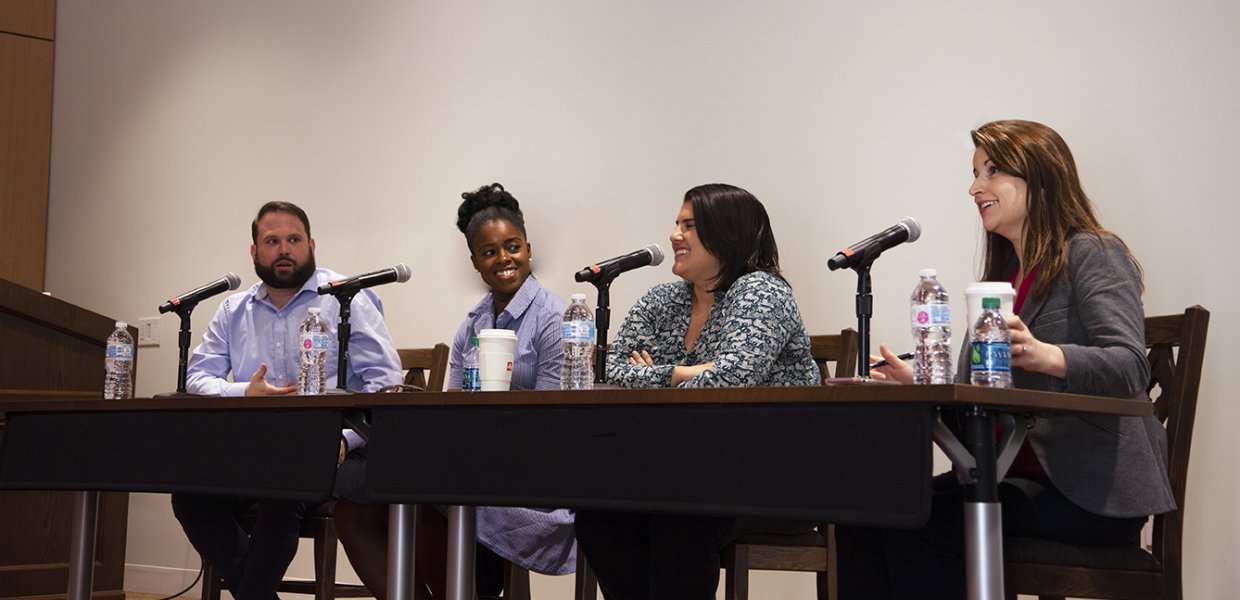On Oct. 16 — exactly three weeks before Election Day 2018 — USC Annenberg convened a panel of political experts to discuss the home stretch of this election cycle.
The Journalism Director’s Forum, moderated by Christina Bellantoni, director of USC Annenberg’s Media Center and longtime political journalist for the Los Angeles Times, covered a variety of angles on the election, including political advertising, ballot initiatives, young voter turnout, the Trump factor, and how seven key Congressional races in California might determine which party controls the House of Representatives.
Here are a few key thoughts from each of the panelists on why your vote will matter during the midterm election on November 6.
Marc Ambinder, USC Annenberg Adjunct Professor
TheWeek.com’s editor-at-large, Ambinder is also a contributing editor for The Atlantic and GQ. Formerly, he served as White House correspondent for National Journal, chief political consultant for CBS News and politics editor at The Atlantic.
“Christina, you made this point to me and I'll give you credit for it: In the past, in the Democratic Party, people would wait their turn to run. They would have some sort of elected officer experience, they’d go the traditional route — but that's not happening [this year]. People are running based on their life stories and their life experiences. And guess what? For some reason that's connecting a lot more with voters and voters are more excited about those candidates. So, you do have an extraordinarily diverse — in terms of every everything — crop of Democratic candidates who themselves have so many different experiences, and voters seem to be excited.”
Christina Bellantoni, Director, USC Annenberg’s Media Center
Over her 20 years in journalism, Bellantoni worked as a reporter and editor, behind the camera as a producer and in front of it as an analyst on national television. She has covered local, state and federal government, along with four presidential campaigns and the White House.
“A lot of elections are decided by very slim margins. Does anybody know who controls the Virginia House of delegates? It’s the Republicans, and the reason why? There was one election that was completely tied. They had a recount, still tied. Two recounts, still tied. They picked a name out of a hat to decide who would control that chamber, which has enormous power from redistricting to everything else. So, just keep that in mind if anybody says, ‘My vote doesn't matter, here in blue California.’”
Melanie Mason, Staff Writer, Los Angeles Times
Mason covers state government and politics in Sacramento. She first began working for the Los Angeles Times in 2011 in Washington, D.C., where she covered money and politics during the 2012 presidential campaign.
“We know that midterm elections tend to be lower turnout, older, whiter, usually more conservative-leaning voting base. But this year feels like it could be different. There's so much mobilization, and a lot of Trump backlash. Something that struck me when talking to consultants in Sacramento back in 2017, even after the 2016 election, is, we don't know what our voters are actually going to look like. There are so many ripple effects in terms of what initiatives people wanted to put up or what the effect is going to be on statewide races. So, I'm going to be very interested to see if this falls back into the normal patterns of what a midterm electorate looks like, as opposed to a presidential [election year], or if we really do see a deviation from the norm.”
Shaniqua McClendon, Political Director, Crooked Media
Crooked Media is home to the popular podcast Pod Save America. At Crooked Media, McClendon is leading the creation and implementation of their midterm voter engagement program, Vote Save America, and engaging the company in elevating Democratic candidates across the country.
“So many people say, constantly, ‘I don't think my vote matters.’ We have to make the connection between all the anger and frustration that we feel when things happen and actually seeing that you can literally change that if you go vote. I don't think it helps that there are efforts to suppress the vote because if you internalize that, it's, ‘Okay, well, I do want to vote and I still can't, so why would I even try to engage in that way?’ But if people turn out in three weeks, I really think that they will be able to see the connection of, ‘I had outrage, but I also voted, and then I got a different result.’
“The biggest reason [for younger voters]to vote is so that you can control your future. President Obama did an interview for our Wilderness podcast, and he talked about how Michelle Obama always tells their girls, ‘Would you let your grandmother pick out your clothes or make your Spotify playlist? No, you wouldn't. So, why would you let her determine what your future is?’ We have the power, we just need to use it.”
